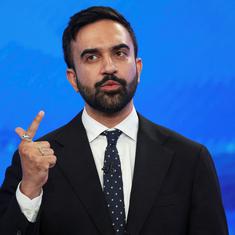Britain backs BBC’s editorial freedom after India’s tax surveys
The action was a ‘deliberate act of intimidation following the release of an unflattering documentary’ about Modi, a Democratic Unionist Party MP said.

British Foreign Office Minister David Rutley on Tuesday said that his government stands with the BBC, a week after Indian tax authorities searched the broadcaster’s New Delhi and Mumbai offices.
“We fund the BBC,” Rutley said in the House of Commons. “We think the BBC World Service is vital. We want the BBC to have that editorial freedom. It criticises us [the Conservatives], it criticises the Labour party, and it has that freedom that we believe is so important. That freedom is key, and we want to be able to communicate its importance to our friends across the world, including the government in India.”
"We stand up for the BBC. We fund the BBC...freedom is key, and we want to be able to communicate its importance to our friends across the world, including the Government in India", says UK Govt Minister David Rutley in UK Parliament on IT surveys on BBC pic.twitter.com/pbElJt8Lur
— Sidhant Sibal (@sidhant) February 21, 2023
The searches, which the officials had described as a “survey operation”, began on February 14 and lasted nearly 60 hours.
The Central Board of Direct Taxes claimed that the three-day inspection revealed that the BBC’s income in India is not commensurate with the scale of operations in the country.
“During the course of the survey, the department gathered several evidences pertaining to the operation of the organisation which indicate that tax has not been paid on certain remittances which have not been disclosed as income in India by the foreign entities of the group,” it said.
The searches were conducted less than a month after the BBC released a two-part documentary that examined Prime Minister Narendra Modi’s alleged role in the 2002 riots in Gujarat, in which more than 1,000 people – most of them Muslims – were killed.
Several global media rights advocates and India’s opposition leaders have condemned the searches, saying the timing of the action just weeks after the documentary aired “smacked of intimidation”. However, Kanchan Gupta, a senior advisor to the Union Ministry of Information and Broadcasting, claimed that there was no connection between the BBC documentary and the Income Tax surveys.
On Tuesday, Rutley said that British ministers have raised the matter with their Indian counterparts. “We continue to monitor the situation,” the foreign office minister added.
Labour Party MP and shadow foreign minister Fabian Hamilton said that the tax surveys were deeply worrying.
“We Opposition members are particularly worried about reports that BBC staff were forced to stay in their offices overnight, and have faced lengthy questioning,” Hamilton said. “In any democracy, the media must have the ability to criticise and scrutinise political leaders without fear of repercussions.”
The BBC is a globally respected and trusted broadcaster. It must be free to operate without intimidation.
— Fabian Hamilton (@FabianLeedsNE) February 21, 2023
India is rightly proud of its place as the world’s largest democracy. However, in a democracy with true media freedoms, the freedom of expression must be protected. pic.twitter.com/c9ERM6jd8u
Northern Ireland’s Democratic Unionist Party leader Jim Shanon said that the surveys were “a deliberate act of intimidation following the release of an unflattering documentary about the country’s leader”.
“The raids happened seven days ago…there has been silence from the Foreign, Commonwealth and Development Office,” Shannon said. “No [British] government statements have been issued, and it has taken an urgent question to encourage the government to condemn this blatant attack on press freedoms.”
India has fallen 10 spots to 150th on the World Press Freedom Index, compiled by Reporters Without Borders, since Modi came to power in 2014.
Also read:
- Why India’s crackdown on BBC has left foreign correspondents anxious
- From Emergency to Modi: How the BBC has played a major role in India









